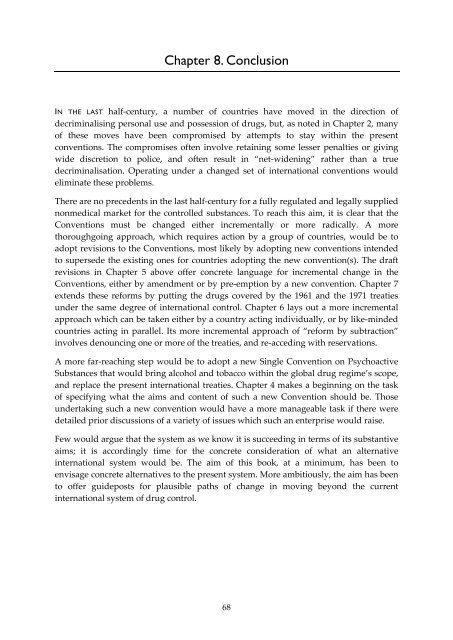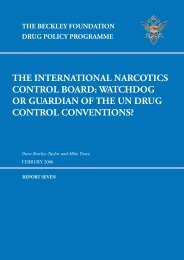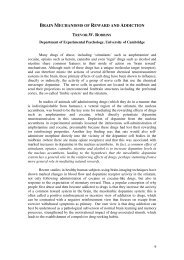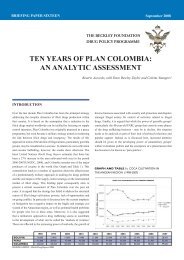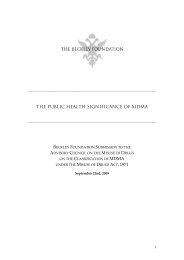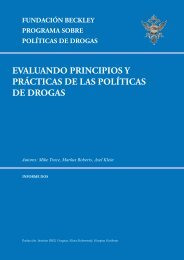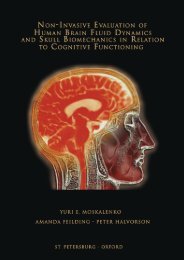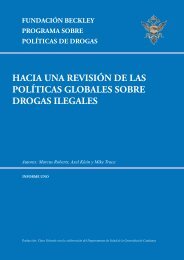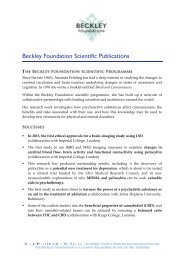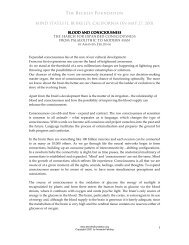roadmaps to reforming the un drug conventions - Beckley Foundation
roadmaps to reforming the un drug conventions - Beckley Foundation
roadmaps to reforming the un drug conventions - Beckley Foundation
Create successful ePaper yourself
Turn your PDF publications into a flip-book with our unique Google optimized e-Paper software.
Chapter 8. ConclusionIN THE LAST half-century, a number of co<strong>un</strong>tries have moved in <strong>the</strong> direction ofdecriminalising personal use and possession of <strong>drug</strong>s, but, as noted in Chapter 2, manyof <strong>the</strong>se moves have been compromised by attempts <strong>to</strong> stay within <strong>the</strong> present<strong>conventions</strong>. The compromises often involve retaining some lesser penalties or givingwide discretion <strong>to</strong> police, and often result in “net-widening” ra<strong>the</strong>r than a truedecriminalisation. Operating <strong>un</strong>der a changed set of international <strong>conventions</strong> wouldeliminate <strong>the</strong>se problems.There are no precedents in <strong>the</strong> last half-century for a fully regulated and legally suppliednonmedical market for <strong>the</strong> controlled substances. To reach this aim, it is clear that <strong>the</strong>Conventions must be changed ei<strong>the</strong>r incrementally or more radically. A morethoroughgoing approach, which requires action by a group of co<strong>un</strong>tries, would be <strong>to</strong>adopt revisions <strong>to</strong> <strong>the</strong> Conventions, most likely by adopting new <strong>conventions</strong> intended<strong>to</strong> supersede <strong>the</strong> existing ones for co<strong>un</strong>tries adopting <strong>the</strong> new convention(s). The draftrevisions in Chapter 5 above offer concrete language for incremental change in <strong>the</strong>Conventions, ei<strong>the</strong>r by amendment or by pre-emption by a new convention. Chapter 7extends <strong>the</strong>se reforms by putting <strong>the</strong> <strong>drug</strong>s covered by <strong>the</strong> 1961 and <strong>the</strong> 1971 treaties<strong>un</strong>der <strong>the</strong> same degree of international control. Chapter 6 lays out a more incrementalapproach which can be taken ei<strong>the</strong>r by a co<strong>un</strong>try acting individually, or by like-mindedco<strong>un</strong>tries acting in parallel. Its more incremental approach of “reform by subtraction”involves deno<strong>un</strong>cing one or more of <strong>the</strong> treaties, and re-acceding with reservations.A more far-reaching step would be <strong>to</strong> adopt a new Single Convention on PsychoactiveSubstances that would bring alcohol and <strong>to</strong>bacco within <strong>the</strong> global <strong>drug</strong> regime’s scope,and replace <strong>the</strong> present international treaties. Chapter 4 makes a beginning on <strong>the</strong> taskof specifying what <strong>the</strong> aims and content of such a new Convention should be. Those<strong>un</strong>dertaking such a new convention would have a more manageable task if <strong>the</strong>re weredetailed prior discussions of a variety of issues which such an enterprise would raise.Few would argue that <strong>the</strong> system as we know it is succeeding in terms of its substantiveaims; it is accordingly time for <strong>the</strong> concrete consideration of what an alternativeinternational system would be. The aim of this book, at a minimum, has been <strong>to</strong>envisage concrete alternatives <strong>to</strong> <strong>the</strong> present system. More ambitiously, <strong>the</strong> aim has been<strong>to</strong> offer guideposts for plausible paths of change in moving beyond <strong>the</strong> currentinternational system of <strong>drug</strong> control.68


